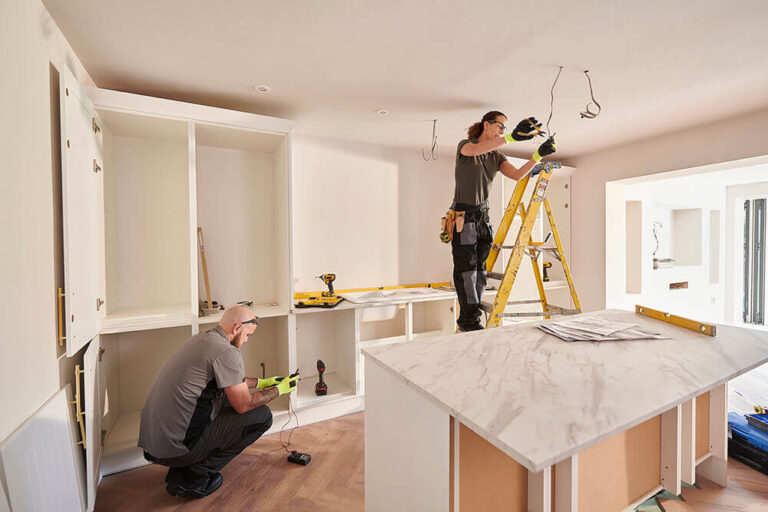Let’s talk about one of the biggest decisions you might face as a homeowner.
That moment when you look around your house and think, “This place just isn’t working for us anymore.”
Maybe your family’s growing, your kitchen feels too cramped, or you’re tired of that one bathroom everyone fights over each morning.
When that feeling hits, you’ve got two main options: fix up what you’ve got or pack it all up and move somewhere new.
It’s never a simple choice, and honestly, what works for your neighbor might be totally wrong for you.
I’m going to walk you through nine practical tips to help you figure out whether to renovate your current home or start fresh somewhere else.
No fancy jargon, just straight talk about what matters when making this big decision.
9 Tips Which Is Better Home Improvement Or Moving?
This isn’t about pushing you one way or the other.
Your situation is unique, and the “right” answer depends on a bunch of factors that only you can weigh.
These tips will help you think through the options clearly so you can make a choice you won’t regret later.
Evaluate Your Current Home’s Potential
Take a good look around your house with fresh eyes.
Not the eyes that see all the problems, but eyes that see possibilities.
Walk through each room asking, “What could this space become?”
That awkward dining room nobody uses? Maybe it’s your future home office. The unfinished basement renovation? Perhaps it’s a teen hangout waiting to happen.
Look up, down, and even outside. Attics, basements, and backyards often hold untapped potential.
Ask yourself what truly bothers you about your current home.
Is it something fixable like outdated bathrooms or a cramped kitchen? Or is it something unchangeable like the location or lot size? Some problems can be solved with a sledgehammer and some imagination, while others are permanent features no amount of home improvement projects can deliver changes for.
Grab a notebook and list what you love and hate about your current home.
Then mark which hate-list items could actually be fixed.
You might be surprised by how much potential is hiding in plain sight.
Compare the Total Costs
Money talks, and in this decision, it speaks pretty loudly.
But the numbers aren’t always what they seem at first glance.
Moving costs add up fast: realtor fees (usually 5-6% of your sale price), closing costs, moving expenses, possible renovations to your new place, and that weird tax stuff nobody warns you about.
Don’t forget about new furniture because somehow your old couch never fits right in the new living room.
Renovating isn’t cheap either.
Major kitchen overhauls can run $30,000-$60,000, adding a bathroom design might cost $20,000-$50,000, and even “simple” projects have a funny way of uncovering expensive surprises hiding in your walls or under your floors.
The smart move? Get actual quotes from contractors for your renovation wishes AND talk to a realtor about selling costs.
Don’t trust those home improvement shows where they redo an entire kitchen for what it would cost most of us to buy a fancy faucet.
Remember to think long-term too.
A bigger house means bigger utility bills, property taxes, and maintenance costs forever – not just on moving day.
Think About Neighborhood Value
Your house sits in a neighborhood that affects everything from your daily happiness to your property value.
And no amount of granite countertops can change that fact.
Do you love where you live? Are the schools good? Can you walk to stuff you enjoy? Is it safe? Are your neighbors awesome or awful? How’s your commute? These quality-of-life factors matter more than most people admit when they’re dazzled by stainless steel appliances.
Also consider whether your neighborhood is getting better or worse.
Check if home prices are rising, new businesses are opening, or if the area is becoming more desirable.
A stunning renovation in a declining neighborhood might not pay off financially.
On the flip side, if you’re in a hot neighborhood you love but your house is the ugly duckling on the block, renovating might make perfect sense.
You keep the location perks while bringing your home up to neighborhood standards.
Consider Emotional & Lifestyle Attachment
Houses aren’t just boxes we live in – they’re homes filled with memories and comfort.
This part isn’t about dollars and cents – it’s about how you feel.
Maybe your kids measured their height on that kitchen doorframe.
Maybe it’s the first home you bought with your partner.
Maybe your garden took years to get just right.
These emotional attachments are real and valid parts of your decision.
Think about your lifestyle too. Do you hate yard work but currently have a tiny yard? A bigger property might make you miserable.
Love to entertain but have a cramped dining room? Renovating for more space might bring you years of joy.
Write down what daily life would look like after a renovation versus a move.
Which version feels more like home? Which makes you smile when you picture waking up there a year from now?
Analyze the Urgency of Your Needs
Timing matters. Are you desperate for more space because twins are on the way? Or just daydreaming about a fancier kitchen someday?
Urgent needs might push you toward moving, especially if your required changes are major.
Building that first-floor bedroom for grandma who can’t climb stairs anymore? That’s probably faster to find in an existing home than to design and build from scratch.
For less urgent desires, renovation often makes more sense.
You can tackle projects one at a time as budget allows, spreading costs over years rather than needing everything perfect on day one in a new house.
Make a timeline of your needs.
If most things can wait a few years, you have more flexibility to improve gradually.
If everything feels urgent, moving might give you that fresh start all at once.
Estimate Home Value Return on Renovations
Not all improvements boost your home value equally.
Some home improvement projects can deliver amazing returns while others might just make you happy without adding much financial value.
Kitchen and bathroom updates typically return 70-80% of their cost when you sell.
Energy efficiency improvements like windows and insulation save you money now AND appeal to future buyers.
Meanwhile, super-personalized choices (like turning your garage into a giant aquarium) might actually hurt your home’s value.
Research which improvements typically pay back best in YOUR specific area.
Finished basements might be must-haves in some regions and worthless in others.
Swimming pools might add value in Florida and subtract it in Minnesota.
If you’re planning to stay put for at least 5 years, prioritize renovations that improve your daily life.
If you might sell sooner, focus on changes with broad appeal that boost resale value.
Assess Market Conditions
The housing market and economy affect both renovation and moving decisions more than most people realize.
In a hot seller’s market where homes get multiple offers above asking price, selling might be easy but buying will be tough.
You might get top dollar for your current place but overpay for the next one.
During construction material shortages (like we’ve seen recently), renovation costs skyrocket and timelines stretch out unpredictably.
A simple kitchen remodel could take months longer than normal.
Interest rates matter too.
Low rates might make a bigger mortgage affordable for a new home.
High rates might make improving your current mortgage-free or low-rate home more attractive.
Talk to both contractors and real estate agents about current conditions in your area.
What are the wait times for good contractors? How long do homes in your price range typically sit on the market? Getting the timing right can save you thousands.
Account for Stress, Time, and Disruption
Let’s get real about the non-financial costs of both options.
They’re significant and often underestimated.
Major renovations mean dust everywhere, strangers in your house for months, unexpected delays, daily decisions about things you never knew existed, and possibly living without a kitchen or bathroom temporarily.
It’s stressful even when everything goes perfectly (which it never does).
Moving means packing every single thing you own, cleaning spaces you forgot existed, address changes, setting up new utilities, finding new doctors and favorite restaurants, and that weird period where your new house doesn’t quite feel like home yet.
Be honest with yourself about which type of stress you handle better.
Some people would rather endure six months of construction than one weekend of moving.
Others would rather pack a thousand boxes than deal with contractor delays.
Consider your work schedule, kids’ school years, and family needs when planning either option.
Both renovating and moving go smoother when timed around your life’s natural rhythms.
And if moving ends up being the better choice, hiring professional movers like Square Cow can make the process far less stressful.
Consult Experts Before Deciding
You don’t have to figure all this out alone, and honestly, you probably shouldn’t.
Experts can help you see angles you might miss.
Talk to a real estate agent about what your home is worth now and what it might be worth after property renovations.
They can also show you homes that might meet your needs to give you a realistic idea of what’s available in your price range.
Have contractors give you actual quotes for your renovation wishes.
Not TV show estimates or what your buddy paid three years ago – real numbers for your specific home right now.
Consider talking to an architect about whether your renovation dreams are structurally possible and permittable in your area.
Not all walls can be removed, and not all additions are allowed by local zoning.
A financial advisor can help you understand the long-term impact of different housing choices on your overall financial health, including tax implications you might not have considered.
These professional opinions aren’t just about avoiding mistakes – they often open up creative solutions you might not have thought of on your own.
Making Your Choice
When you’ve worked through all these considerations, your answer probably won’t be a dramatic lightbulb moment.
Instead, you’ll notice the scale gradually tipping toward one option as the smarter choice for your specific situation.
Remember that neither choice is permanent.
People who renovate sometimes still move later.
People who move sometimes still renovate their new place. You’re making the best decision for right now, not forever.
Trust your gut feeling too.
Sometimes after all the practical analysis, what matters most is which option just feels right for your family.
That feeling isn’t fuzzy thinking – it’s your brain processing all these factors at once.
The perfect home doesn’t exist – whether you renovate or move, you’ll be creating the right home for you through the choices you make.
Good luck with whatever path you choose!



